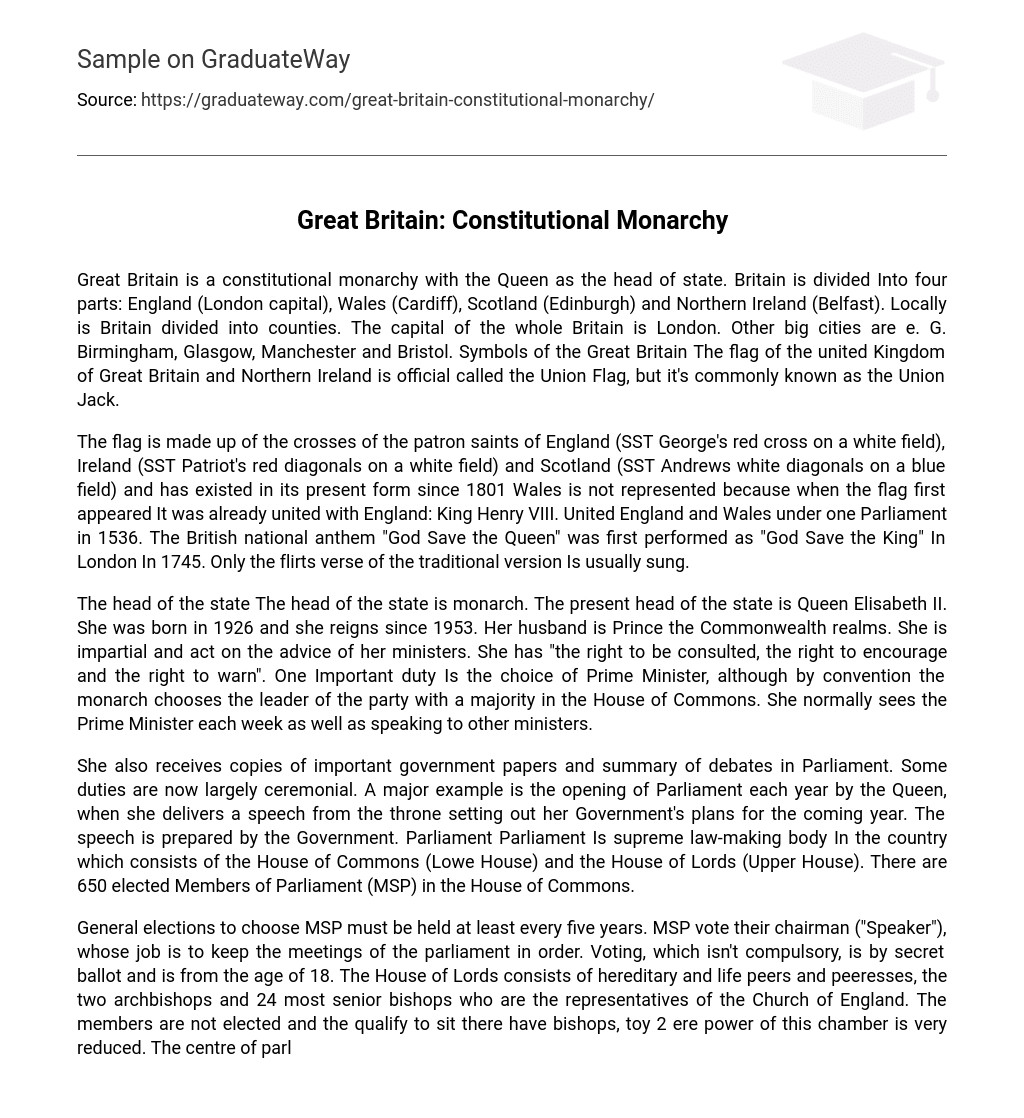Great Britain is a constitutional monarchy with the Queen as the head of state. Britain is divided Into four parts: England (London capital), Wales (Cardiff), Scotland (Edinburgh) and Northern Ireland (Belfast). Locally is Britain divided into counties. The capital of the whole Britain is London. Other big cities are e. G. Birmingham, Glasgow, Manchester and Bristol. Symbols of the Great Britain The flag of the united Kingdom of Great Britain and Northern Ireland is official called the Union Flag, but it’s commonly known as the Union Jack.
The flag is made up of the crosses of the patron saints of England (SST George’s red cross on a white field), Ireland (SST Patriot’s red diagonals on a white field) and Scotland (SST Andrews white diagonals on a blue field) and has existed in its present form since 1801 Wales is not represented because when the flag first appeared It was already united with England: King Henry VIII. United England and Wales under one Parliament in 1536. The British national anthem “God Save the Queen” was first performed as “God Save the King” In London In 1745. Only the flirts verse of the traditional version Is usually sung.
The head of the state The head of the state is monarch. The present head of the state is Queen Elisabeth II. She was born in 1926 and she reigns since 1953. Her husband is Prince the Commonwealth realms. She is impartial and act on the advice of her ministers. She has “the right to be consulted, the right to encourage and the right to warn”. One Important duty Is the choice of Prime Minister, although by convention the monarch chooses the leader of the party with a majority in the House of Commons. She normally sees the Prime Minister each week as well as speaking to other ministers.
She also receives copies of important government papers and summary of debates in Parliament. Some duties are now largely ceremonial. A major example is the opening of Parliament each year by the Queen, when she delivers a speech from the throne setting out her Government’s plans for the coming year. The speech is prepared by the Government. Parliament Parliament Is supreme law-making body In the country which consists of the House of Commons (Lowe House) and the House of Lords (Upper House). There are 650 elected Members of Parliament (MSP) in the House of Commons.
General elections to choose MSP must be held at least every five years. MSP vote their chairman (“Speaker”), whose job is to keep the meetings of the parliament in order. Voting, which isn’t compulsory, is by secret ballot and is from the age of 18. The House of Lords consists of hereditary and life peers and peeresses, the two archbishops and 24 most senior bishops who are the representatives of the Church of England. The members are not elected and the qualify to sit there have bishops, toy 2 ere power of this chamber is very reduced. The centre of parliamentary power is the House of Commons.
The House of Lords as a revising chamber should complement the Commons and not rival it. It resides in Palace of Westminster (“House of parliament”). New laws are debated at first in the House of Commons, then in the House of Lords and finally signed by the Queen raiment The Government is an executive power and it’s formed by the party with majority support in the Commons. The Queen appoints its leader as Prime Minister (the leader of the party which holds the majority of seats in the House of Commons becomes the Prime Minister). The current Prime Minister is David Cameron (since 010, Conservative party).
The Prime Minister chooses the MSP, who will run different departments of government – Ministers. The country is in fact governed by the Cabinet, I. E. About twenty leading ministers headed by the Prime Minister. The second largest party form the official Opposition, with its own leader and “shadow cabinet”. The Opposition has a duty to criticize government policies and to present an alternative programmer. Political parties There are three main political parties in Britain: the Conservative Party, the Labor Party and the Liberal-Democratic Party.





